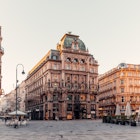
May 18, 2020 • 2 min read

Bonn and Beethoven – the two go together like strawberries and cream. It was in this little town on the Rhine where the musical giant was born in 1770. That means he’s got a big birthday in 2020, and Bonn is gearing up to throw its most famous son one heck of a party.
Starting in December 2019, the city of Bonn will be hosting the Beethoven Anniversary Year, a jubilee featuring a number of cultural programs, events and exhibitions honoring its hometown genius. These festivities will make any visit to Bonn during 2020 a uniquely music-inflected experience.

The humble town house where Ludwig van Beethoven came squalling into this world is sitting pretty in pink with forest-green shutters in the cobbled pedestrian zone of Bonn, some 30km up the Rhine river from Cologne. It’s been a museum and pilgrimage site – called Beethoven-Haus – since 1889. Closed for a revamp, it will reopen to great fanfare on 17 December 2019; there will be a new music room and temporary exhibitions in an added wing, but at its heart it will remain a glorious treasure chest of Beethoven memorabilia. Visitors traipsing through the doll-house-sized rooms can admire original scores, imagine him sitting at his last grand piano, ogle a pair of framed white tresses and marvel at the huge ear trumpets he used to combat his growing deafness.
Most visitors tend to linger longest at the most prized – and haunting – exhibit: Beethoven’s original death mask. Cast just a few hours after his final breath by the painter Josef Danhauser in Vienna, it shows the genius as a gaunt man with hollowed cheeks, downturned lips and a high forehead from which sprang some of the greatest hits in classical music.

Ba-da-da-Boom! No need to be a connoisseur to recognise the ominous first four notes of the Fifth Symphony. Or the soul-stirring theme of his perhaps even more famous Ninth Symphony, the ‘Ode to Joy’, that was chosen as the official European anthem in 1972. Fittingly, a performance of the Ninth, with its message of peace and humanity, will be the jubilee’s grand finale on 17 December 2020, exactly 250 years to the day of Beethoven’s baptism. No less than renowned conductor Daniel Barenboim will swing the baton at this gala concert that will cap a year of music, lectures, exhibits, film screenings and events for kids and teens.

Highlights include visits from such world-famous orchestras as the London Symphony Orchestra led by Sir Simon Rattle. There will also be two editions (in spring and autumn 2020) of the annual Beethovenfest music festival, an exhibit on the meaning of the Ninth Symphony in various world cultures, and a concert barge that will perform experimental music on its voyage from Bonn to Vienna. The anniversary year celebrations will also feature a unique initiative called the Beethoven Pastoral Project, an environmental campaign inspired by the nature-celebrating Pastoral Symphony, aka Symphony No 6, culminating on June 5, World Environment Dat. Finally, the city will launch the ‘Beethoven Story’, a string of 22 multimedia pillars installed at biographical waystations that will help visitors understand how Bonn shaped the man behind the music, and vice versa.

Beethoven spent the first 22 years of his life in Bonn before decamping to Vienna. The Bonn of his boyhood was a small, walled town accented by many buildings that have survived time and wars to this day, including the immodest palace of the prince-electors of Cologne, Kurfürstliches Schloss (today’s main university building), the silver-and-gold trimmed rococo town hall and the medieval minster with its jaunty, slate-covered turrets. The basilica overlooks Münsterplatz, a cobbled square anchored by the world’s first public Beethoven Monument, unveiled on the 75th anniversary of his birth. It shows him dignified and distant atop a stone pedestal, dressed in a pleated cape and clutching a quill and a musical score in either hand.

In the background, the famous minster looms above the graves of two Roman soldiers who were martyred in the 3rd century and later promoted to be the city’s patron saints. The pair also serve as a reminder that Bonn, founded by the Romans in the 1st century BC, is actually one of Germany’s oldest cities. More vestiges of the past, going back to the days of the Neanderthals, make up the bulk of exhibits at the nearby LandesMuseum Bonn, the regional history museum.
It was in another church, the graceful St Remigiuskirche on nearby Brüdergasse, where Beethoven’s parents got married and little Ludwig was baptized. He was named for his grandfather, the pater familias, an accomplished musician and director of the court orchestra. The marble font is still there, softly illuminated by light filtering in through tall, slender Gothic windows. The church’s organ that Beethoven later played in this church, though, was crushed by WWII bombs.

About 1.5km southeast of the old town, Bonn flaunts a distinctly modern look. This is the Bundesviertel, the government quarter that was built after 1949 when Bonn edged out Frankfurt as the capital of the newly founded Federal Republic of Germany. Although reunited Germany’s federal government moved to Berlin in 1999, the area is hardly a ghost town. There’s a UN campus here along with other international and federal institutions. A self-guided tour, called Weg der Demokratie (Path of Democracy), links such Cold War-era buildings as the plenary hall where the Bundestag (German parliament) used to hammer out its policies, and the Villa Hammerschmidt, the one-time official residence of the German president. Also here is the Haus der Geschichte (House of History) that delivers a highly engaging immersion in German post-WWII history and is one of the country’s most visited museums for good reason.
The House of History is part of the coterie of shiny museums that gives Bonn an extra-large cultural footprint. A delicacy for art lovers is the Kunstmuseum, housed in a strikingly minimalist structure with an hourglass-shaped main staircase. Inside awaits a feast of 20th-century art with pride of place going to the works of August Macke and other Rhenish expressionists. While here, it’s also worth checking out the latest exhibit at the adjacent Bundeskunsthalle (Federal Exhibit Hall), which focuses not only on art but also on the fields of science, history, technology and the environment.

Art and Culture
Western Germany’s hip region for digital nomads and urban creativesSep 28, 2021 • 6 min read

May 18, 2020 • 2 min read







